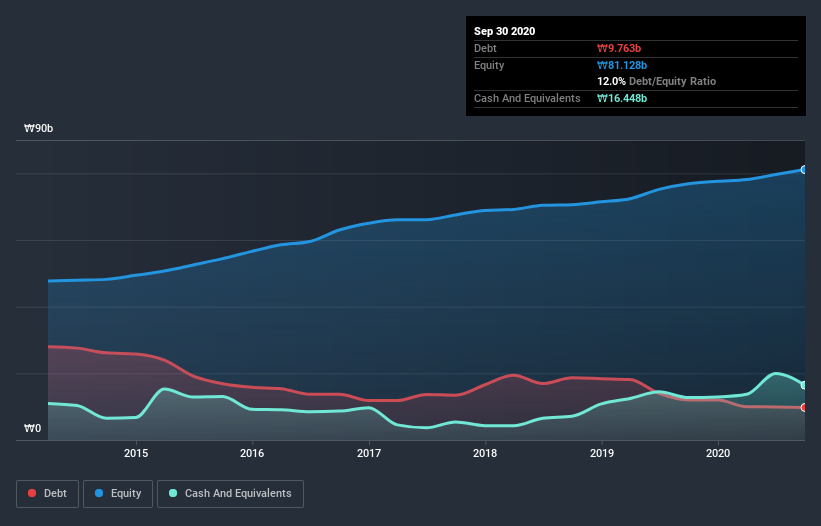- South Korea
- /
- Basic Materials
- /
- KOSE:A011390
These 4 Measures Indicate That Busan Industrial (KRX:011390) Is Using Debt Reasonably Well

Howard Marks put it nicely when he said that, rather than worrying about share price volatility, 'The possibility of permanent loss is the risk I worry about... and every practical investor I know worries about.' It's only natural to consider a company's balance sheet when you examine how risky it is, since debt is often involved when a business collapses. As with many other companies Busan Industrial Co., Ltd. (KRX:011390) makes use of debt. But the more important question is: how much risk is that debt creating?
When Is Debt Dangerous?
Debt assists a business until the business has trouble paying it off, either with new capital or with free cash flow. In the worst case scenario, a company can go bankrupt if it cannot pay its creditors. However, a more usual (but still expensive) situation is where a company must dilute shareholders at a cheap share price simply to get debt under control. Having said that, the most common situation is where a company manages its debt reasonably well - and to its own advantage. The first thing to do when considering how much debt a business uses is to look at its cash and debt together.
See our latest analysis for Busan Industrial
What Is Busan Industrial's Net Debt?
You can click the graphic below for the historical numbers, but it shows that Busan Industrial had ₩9.76b of debt in September 2020, down from ₩12.0b, one year before. However, its balance sheet shows it holds ₩16.4b in cash, so it actually has ₩6.69b net cash.

How Healthy Is Busan Industrial's Balance Sheet?
The latest balance sheet data shows that Busan Industrial had liabilities of ₩39.9b due within a year, and liabilities of ₩7.88b falling due after that. Offsetting these obligations, it had cash of ₩16.4b as well as receivables valued at ₩20.2b due within 12 months. So its liabilities outweigh the sum of its cash and (near-term) receivables by ₩11.2b.
Of course, Busan Industrial has a market capitalization of ₩127.8b, so these liabilities are probably manageable. But there are sufficient liabilities that we would certainly recommend shareholders continue to monitor the balance sheet, going forward. Despite its noteworthy liabilities, Busan Industrial boasts net cash, so it's fair to say it does not have a heavy debt load!
The modesty of its debt load may become crucial for Busan Industrial if management cannot prevent a repeat of the 34% cut to EBIT over the last year. When a company sees its earnings tank, it can sometimes find its relationships with its lenders turn sour. The balance sheet is clearly the area to focus on when you are analysing debt. But it is Busan Industrial's earnings that will influence how the balance sheet holds up in the future. So when considering debt, it's definitely worth looking at the earnings trend. Click here for an interactive snapshot.
Finally, a company can only pay off debt with cold hard cash, not accounting profits. Busan Industrial may have net cash on the balance sheet, but it is still interesting to look at how well the business converts its earnings before interest and tax (EBIT) to free cash flow, because that will influence both its need for, and its capacity to manage debt. During the last three years, Busan Industrial generated free cash flow amounting to a very robust 83% of its EBIT, more than we'd expect. That puts it in a very strong position to pay down debt.
Summing up
While it is always sensible to look at a company's total liabilities, it is very reassuring that Busan Industrial has ₩6.69b in net cash. And it impressed us with free cash flow of ₩7.4b, being 83% of its EBIT. So we don't have any problem with Busan Industrial's use of debt. There's no doubt that we learn most about debt from the balance sheet. But ultimately, every company can contain risks that exist outside of the balance sheet. For instance, we've identified 2 warning signs for Busan Industrial (1 makes us a bit uncomfortable) you should be aware of.
If, after all that, you're more interested in a fast growing company with a rock-solid balance sheet, then check out our list of net cash growth stocks without delay.
If you decide to trade Busan Industrial, use the lowest-cost* platform that is rated #1 Overall by Barron’s, Interactive Brokers. Trade stocks, options, futures, forex, bonds and funds on 135 markets, all from a single integrated account. Promoted
Valuation is complex, but we're here to simplify it.
Discover if Busan Industrial might be undervalued or overvalued with our detailed analysis, featuring fair value estimates, potential risks, dividends, insider trades, and its financial condition.
Access Free AnalysisThis article by Simply Wall St is general in nature. It does not constitute a recommendation to buy or sell any stock, and does not take account of your objectives, or your financial situation. We aim to bring you long-term focused analysis driven by fundamental data. Note that our analysis may not factor in the latest price-sensitive company announcements or qualitative material. Simply Wall St has no position in any stocks mentioned.
*Interactive Brokers Rated Lowest Cost Broker by StockBrokers.com Annual Online Review 2020
Have feedback on this article? Concerned about the content? Get in touch with us directly. Alternatively, email editorial-team (at) simplywallst.com.
About KOSE:A011390
Slight with worrying balance sheet.
Market Insights
Community Narratives



